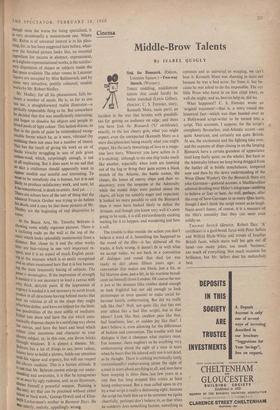Cinema
Middle-Brow Talents
By ISABEL QUIGLY THREE middling, middlebrow talents that could hardly be better matched (Lewis Gilbert, director; C. S. Forester, story; Kenneth More, main part); an incident in the war that bristles with possibili- ties for getting an audience on edge; and there you have Sink the Bismarck (`U' certificate); exactly, to the last cheery grin, what you might expect, even the unexpected (Kenneth More as a stern disciplinarian) being exactly what you might expect, like the early thwartings of love in a maga- zine love story. Wherever you have action in it it is exciting : although to me one ship looks much like another, especially when both are looming out of the fog or firing their guns across a black stretch of the Atlantic, the battle scenes, the chases, the losses of enemy ships and their re- discovery, even the suspense at the Admiralty while the model ships were pushed about the charts, all kept me suitably eager and expectant. It looked no more possible to sink the Bismarck than it must have looked likely to defeat the Armada, and though you know very well it's soon going to be sunk, it, is still extraordinarily exciting waiting for it to happen, and wondering just how it will.
The trouble is that outside the action you don't believe a word of it. Something has happened to the mood of the film—it has slithered off the tracks, it feels wrong, it doesn't fit in with what we accept today, we are back in a convention of dialogue and mood that died (or was ready to die) about fifteen years ago : a convention that makes one blush, just a bit, as Ed Murrow does, just a bit, in his wartime broad- casts (as himself) from London. Of course the war is just at the distance (like clothes dated enough to look frightful but not old enough to look picturesque or even quaint) to make social be- haviour faintly embarrassing. But did we really talk like, that? Well, not quite like that (no one ever talked like a bad film script), but in that idiom? Look like that, swallow pain like that, feel loneliness, fear, or sudden joy like that? I don't believe it, even allowing for the differences of fashion and convention. The trouble with bad dialogue is that it cheapens what matters most. For instance, there oughtn't to be anything very embarrassing about the sight of a man in tears when he hears that his adored only son is not dead, as he thought. There is mithing intrinsically (only conventionally) embarrassing about the sight of a man in tears about,anything at all, and men have been weeping in films these last few years at a rate that has long stopped film critics at least being embarrassed. But a man called upon to cry by a bad script is really a distressing sight; because the script has built him up to be someone we (quite cheerfully, perhaps) don't believe in, so that when he suddenly does something human, something as common and as universal as weeping, we can't bear it. Kenneth More was shaming in tears not because he was a bad actor, far from it, but be- cause he was asked to do the impossible. The coy little Wren who burst in on him crept away, as well she might; and so, heaven help us, did we.
What happened? C. S. Forester wrote an `original treatment'—that is, a story round the historical fact—which was then banded over to a Hollywood script-writer to be turned into a script. This accounts, I suppose, for the script's completely flavourless, mid-Atlantic accent—not quite American, and certainly not quite British. At sea, the excitement and the fighting take over, and the captains of ships closing in on the limping Bismarck have a certain grandeur of appearance (and keep fairly quiet, on the whole). But back at the Admiralty (where we keep being dragged from the battle) all is brittle nonchalance, tempered now and then by the dewy understanding of the Wren (Dana Wynter). On the Bismarck there are joke-Germans—guttural accents, a Machiavellian admiral drooling over Hitler's telegrams—nothing to believe or fear or hate. As well, perhaps, after the crop of hero-Germans in so many films lately, though I don't think the script meant us to laugh. Nazis aren't funny, of course., it is a measure of the film's unreality that they can seem even mildly so.
Two-way Stretch (director, Robert Day; `A' certificate) is a gaol-break farce with Peter Sellers and Wilfrid Hyde-White and troops of familiar British faces, which starts well but gets out of hand—too many jokes, too much `business,' too much of everything. Not much occasion for brilliance, but Mr. Sellers does his melancholy best.






































 Previous page
Previous page